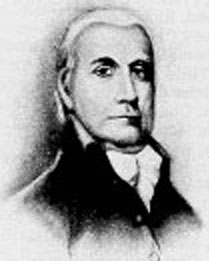| Francis Lewis  Born: 21-Mar-1713 Born: 21-Mar-1713
Birthplace: Llandaff, Wales
Died: 30-Dec-1802
Location of death: New York City
Cause of death: unspecified
Remains: Buried, Trinity Churchyard, Manhattan, NY
Gender: Male
Race or Ethnicity: White
Sexual orientation: Straight
Occupation: Politician Nationality: United States
Executive summary: Signatory to Declaration of Independence Francis Lewis, a signer of the Declaration of Independence, was born in Llandaff, Wales, in March 1713. He was early left as an orphan to the care of his uncle, the dean of St. Paul's, educated at Westminster school, and entered commercial life in London. On coming of age, he sold his patrimony, invested in merchandise, and embarked for this country, where he established mercantile houses in New York and Philadelphia. Lewis made many trading voyages with great success to various parts of Europe, through Russia as far north as Archangel, and on the coast of Africa, and was twice wrecked on the shores of Ireland. In one of his ventures on the African coast, two negro boys and a girl were rescued from an island, where they had been abandoned by kidnappers, and restored to their friends, who rewarded the deliverer with a valuable amount of ivory and gold-dust. Lewis endeavored to establish a regular trade to the mouths of Zambesi river, but was prevented by the jealousy of the Dutch. In 1752 Lewis was at Oswego, and served as volunteer aide to General Hugh Mercer. When the fort was assaulted by the French and Indians, Lewis was given as prisoner of war to the Indians, conducted to Montreal, and sent to France, but was afterward exchanged in a cartel and returned to this country. The British government gave him 5,000 acres of land for his services. In 1765 he moved his family from New York City to Whitestone, Long Island, and gave himself entirely to public affairs. His financial experience and business talent made him a most useful member of the committees on which he served, and the wealth that he had acquired was freely expended in the service of his country. His house at Whitestone was burned by the British, and Mrs. Lewis was imprisoned in the city; but her situation was brought before Congress, and her exchange was finally effected by an order from General George Washington. Lewis was one of the first to join the Sons of Liberty. He was a member of the New York committee in the 1st Colonial Congress, which met in New York City in 1765, was elected a member of the 1st Continental Congress in 1775, was one of the New York Committee of 100, and on several army and finance committees. In the following year he signed the Declaration of Independence, in 1777 he was reelected to Congress, and in 1779 appointed commissioner of the board of admiralty, and elected a vestryman of Trinity church. His old age was happy and cheerful; literature was an unfailing resource, and the society of his grandchildren a great amusement. He died in New York City on 19 December 1803.
Father: (d. early in his life)
Son: Morgan Lewis (Governor of New York, b. 1754, d. 1844)
High School: Westminster School
Signatory to the US Declaration of Independence
Delegate to the Continental Congress 1775, New York
Taken Prisoner of War
Proxy Baptism: Mormon St. George, UT (21-Aug-1877)
Requires Flash 7+ and Javascript.
Do you know something we don't?
Submit a correction or make a comment about this profile
Copyright ©2019 Soylent Communications
|